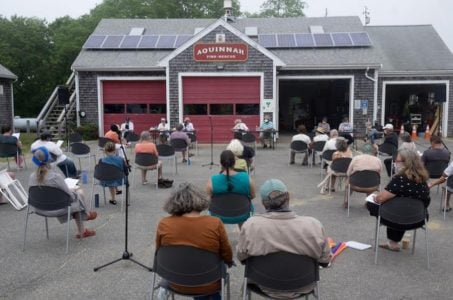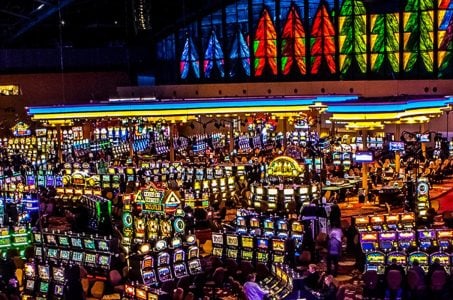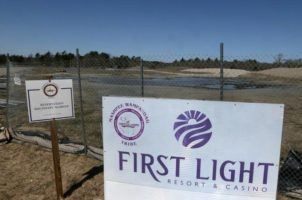Martha’s Vineyard Tribal Bingo Hall Faces More Construction Delays After Judge’s Ruling
Posted on: August 3, 2019, 08:27h.
Last updated on: August 3, 2019, 01:05h.
The Wampanoag Tribe of Gay Head (Aquinnah) cannot resume construction on its proposed Martha’s Vineyard bingo hall until its legal appeals are concluded.

Last week, Massachusetts federal judge F. Dennis Saylor IV denied the tribe’s request for a temporary stay while the First Circuit Court of Appeals reviews the judge’s ruling in the case that the Martha’s Vineyard construction requires local or state permits.
If the stay was granted, the tribe likely could have resumed building in Martha’s Vineyard beyond its preliminary work on the foundation while its appeal was being heard.
Now, the tribe has to hope the appeals court judges will agree with its reasoning that the project is not under the jurisdiction of local permitting by state or local officials. Tribal attorneys have maintained it was not subject to local permitting because the venue falls under the jurisdiction of the federal Indian Gaming Regulatory Act, not local or state laws.
The tribe must comply with any rules and regulations — such as obtaining a building permit and demonstrating that the construction complies with applicable codes — that are applicable generally to the construction of any similar commercial facility in the town of Aquinnah,” the judge said in the recent ruling.
In explaining his decision, Saylor adds stays are only granted in limited circumstances. For instance, the applicant is asked to prove it “is likely to succeed on the merits” of the case, or the applicant will be “irreparably injured” without the stay.
The tribe “has not made a strong showing of likely success on the merits [of the case],” Saylor said. The tribe also has “not demonstrated a likely risk of irreparable injury.”
If Aquinnah town officials were unfair to the tribe, it could seek relief from a judge, Saylor said. “There is no reason, however, at this stage to assume that the tribe will be treated in such a manner.”
Nor has the tribe shown “public interest” favors a stay. “If construction proceeds subject to normal permitting processes, the resulting facility presumably will be in full compliance with the safety, health, environmental, and other requirements of the town and the Commonwealth,” Saylor said.
Initially, Saylor in 2015 ruled against the tribe in its bid, saying it gave up sovereign rights when signing a settlement agreement in 1983. In 2017, the First Circuit Court of Appeals rejected much of Saylor’s ruling, and the US Supreme Court in 2018 chose not to review the case.
Aquinnah Officials Want to Cooperate with Tribe
When asked about Saylor’s recent decision, Aquinnah Town Administrator Jeffrey Madison told Casino.org that the town “supports the tribe in its rights to operate a gaming facility on its sovereign land.”
“We hope to cooperate with them to assure the development is sensitive to issues related to the environment and public safety,” Madison added.
The Martha’s Vineyard Commission, a regional planning agency, denied the project last month. The denial was largely because of inadequate information. The tribe did not take part in the hearing, citing its continued argument that it was not subject to local permitting because the venue falls under the jurisdiction of the federal Indian Gaming Regulatory Act, not local or state laws.
The commission could consider a future application by the tribe. It is likely the commission will again review the project for possible traffic or environmental impact.
Tribe Argues Delay Hurts Its Members
The tribe has argued it will be hurt financially by any delayed opening. It needs the revenue to fund needed programs for tribal members.
The tribe estimates it will receive between $3 million and $5 million a year from revenue. Plans call for a 10,000-square-foot gambling venue that will feature 250 electronic games.
Construction of the gambling hall is expected to take six months to complete.
Related News Articles
Most Popular
UPDATE: Former Resorts World & MGM Grand Prez Loses Gaming License
Jackpot News Roundup: Two Major Holiday Wins at California’s Sky River Casino
VEGAS MYTHS RE-BUSTED: The Traveling Welcome to Las Vegas Sign
Oakland A’s Prez Resigns, Raising Questions About Las Vegas Move
MGM Osaka to Begin Construction on Main Resort Structure in April 2025
Most Commented
-
UPDATE: Whiskey Pete’s Casino Near Las Vegas Closes
— December 20, 2024 — 33 Comments -
Zillow: Town Outside Las Vegas Named the Most Popular Retirement City in 2024
— December 26, 2024 — 31 Comments -
Oakland A’s Prez Resigns, Raising Questions About Las Vegas Move
— December 27, 2024 — 9 Comments -
Caesars Virginia in Danville Now Accepting Hotel Room Reservations
— November 27, 2024 — 9 Comments
















No comments yet